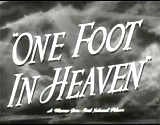
|
One Foot in Heaven (1941)
In director Irving Rapper's and Warners' religious
biographical drama:
- the film opened in Stratford, Ontario, 1904, when
medical student William Spence (Fredric March) described how he
had received a religious 'call' to become a Methodist minister
when passing by a Toronto church, entering, and listening to an
inspiring revival sermon by an evangelical preacher: ("As
I listened, something happened to me. I guess you'd have to say
I got the call....It was just as clear as if the Lord was there
and placed his hand on my shoulder. At the first invitation, I
found myself at the rail....I've decided to become a minister...I'm
not going to be a doctor...I think I'll find everything I would
have found in medicine and more")
- Spence's faithful bride-to-be Hope Morris (Martha
Scott), contrary to her upper class parents' wishes, promised to
remain with him, even though he was making a life-changing decision: "Then
if it's what you want, I think it's what I want for you"; he
would leave Canada, where she followed him to his first appointment
as an ordained minister at a struggling pastorate in a small town
in rural Iowa
- once they arrived in the Iowa town of Laketon by train,
they were greeted and brought to a humble, dilapidated parsonage
home for the new pastor, where he carried her over the threshold
- the new bride's reaction was one of dismay, as Will tried to reassure
her: "Aw, don't worry Hope. When we get your wedding presents
placed around, it won't look that bad"; however, later, she
tearfully told her husband: "I won't be able to use my wedding
presents or anything because, 'cause they'll think I'm stuck-up";
she was told that she couldn't take down the ferocious boar's head
hanging on the wall; her expectations were let down and she complained: "I
used to plan what our first home would be like"; he cheered
her up, but hinted that she shouldn't dress in her finest clothes:
"It won't do for you to outshine the ladies in the congregation.
We're just the pastor and his wife, we're not their bettors. We are
the people's servants"
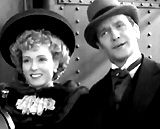
|
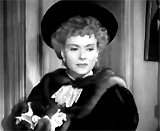
|
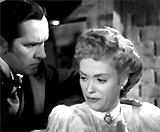
|
|
Arrival in Iowa Town by Train
|
Hope's Dismay at Humble Parsonage Dwelling
|
"They'll think I'm stuck-up"
|
- with the poignant scene in which devoted Methodist
minister Rev. Spence told his oldest son Hartzell (Frankie Thomas
as boy) that he would view his first movie with him (a 1917 William
S. Hart western, "The Silent Man"), and specifically
point out how it was sinful and prohibited: ("Your incorrect
thinking must be my fault, so it's up to me to correct it. You
know what I'm going to do? I'm going to take you next Saturday,
and point out in the film itself why it's not good for you";
however, after watching with his son at his side, he expressed
surprise at the supposedly scandalous western's non-objectionable
content, and cheered on the good guys vs. the bad guys by film's
end: ("That picture wasn't bad. In fact, it had a good moral...Yes,
sir, it was good. It was downright good! In fact, you know what
I'm going to do? I'm going to preach a sermon about it. He who
speaks to only one generation is dead")
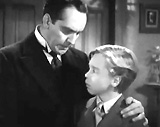
|
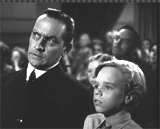
|
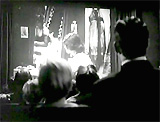
|
|
Viewing of Western Movie with Young Son Hartzell
|
- the scene of Reverend Spence interrupted during
his Sunday sermon to rush to his parsonage home to find it burning
to the ground - he quipped: "Look at that house burn, as heartily
as any sinner in hell" - it occurred at the same time that
he received news of another transfer, and Hope complained about
their frequent upheavals: "You don't know how it hurts me
to bring up my children the way we've had to. Always on the move,
never really being able to settle down anywhere. And they're normal
children, Will. They're entitled to a respectable, permanent home,
even if they are the minister's family" - they had been reassigned
to Sioux City, Iowa to a detachment of military soldiers, to serve
as chaplain during WWI - and Hope was upset: "Now I'll have
to bring my children up in a pup tent!"
- the next church after the Armistice, was located in
Denver, Colorado (where they lived in another dingy and leaky parsonage)
- Rev. Spence commended his long-suffering, virtuous wife as a parson's
wife, and showed his appreciation over the years:
"I'm seeing you for the first time...I haven't been able to see
the forest for the trees....I'm seeing you as you are, Hope. The wife
of a parson. I'm remembering the trials you had to put up with. The
series of parsonages you've had to live in to bring up your children.
Each home dingier than the other. I remember your dream of having a
nice home...You worked in the church, Sunday School, Missionary Societies,
the Sew & Sew Club, the Committee for the Alleviation of the Plight
of the Poor. A full time job in itself. Instead, you've managed to
find time to manage a house, cook and mend and scrub for a family,
rear children, comfort a husband, and you've borne all this with the
serenity of a Madonna"; he promised her he would build a new church
- and parsonage
- the memorable sequences of Rev. Spence's conflict
with his gossipy and snobby members of his Denver church, including
Mrs. Lydia Sandow (Beulah Bondi), who departed over a petty disagreement
to the Baptist Church; one of his controversial decisions was to
replace an aging, off-key church chorus with a young, fresh-faced
children's choir for the summer, thereby offending the music director
Mrs. Thurston (Laura Hope Crews) and her banker husband Preston Thurston
(Gene Lockhart)
- the alleged scandal when spiteful parishioners spread
false and vile hearsay rumors that Will's grown-up son Hartzell (Peter
Caldwell) had allegedly impregnated a classmate named Elsie Mayfield
whose family moved to San Francisco (Hartzell was unjustly expelled
from school and blamed for the pregnancy); Hartzell firmly claimed
he was "not guilty" - and Will soon proved, with a trip
to California, that the girl was not pregnant
- Rev. Spence's successful conflict with his wealthy
parishioners who were forced to backtrack on the false accusations
(he told Mrs. Thurston and Lulu Digby (Mary Field): "Thank god
I'm a Christian or I'd kill you...You cooked up a fine scheme to
get me out of town, didn't you? But you overlooked one thing, Mrs.
Thurston. A preacher stops being a preacher and starts being a father
when his son is attacked...Don't add another falsehood to your sins.
I know the whole story...You crucified a guiltless boy. You got together
with your whole clan and hatched the scheme, didn't you? Didn't you?!
You don't deserve to live. The only reason you don't die is because
the good Lord wouldn't know what to do with you"); he threatened
to shame the gossipers publically from the pulpit; and now that he
had the upper hand, he decided to compel them to contribute to the
church building fund and to finance the refurbishment of the aging
church (with a new stained glass window, expensive organ, and carillon
bells) - and supplemented their support with funds from a repentant,
returning Mrs. Sandow who renewed her membership
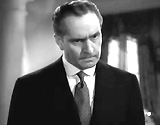
|
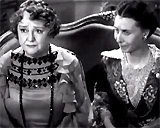
|
Denouncing and Shaming Mrs. Thurston and Mrs.
Digby:
"You crucified a guiltless boy"
|
- the concluding scene of Rev. Spence committed and
determined to move once again and leave his finished parsonage
and dream church, Elmwood Methodist, to help another struggling
church in Iowa ("When a man stands still, he stagnates. I
won't grow moss on my back"); Hope was hesitant about moving
once again, but then told her husband: "There's no sense in
arguing. We'll go. I'll go with you. Will, I'll be glad to go.
Entreat me not to leave thee, but return from following after thee.
For whither thou goest, I will go"
- in the stirring, uplifting and dramatic ending accompanied
by the congregation's singing of the popular church hymn "The
Church's One Foundation", Rev. Spence - on a weekday morning
- viewed the entire congregation from an upper window, at the church's
front courtyard spontaneously assembling, surging forward, and joining
together to sing as he played the hymn on the church's new carillon
above them
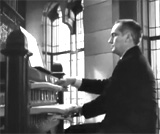
|
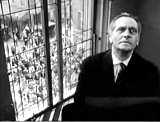
|
Emotional Ending Scene: "The Church's One
Foundation"
Played on Carillon
|
|
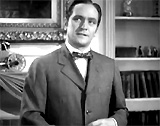
Medical Student William Spence (Fredric March) Announcing "Call" to
Ministry
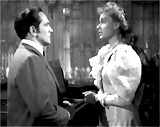
With Bride-to-Be Hope (Martha Scott)

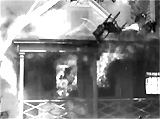
Burning Parsonage in Iowa
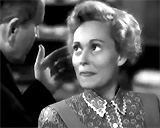
Commending Hope for Her Long-Suffering: "You've borne
all this with the serenity of a Madonna"
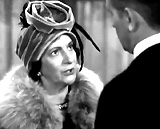
Conflict with Mrs. Sandow (Beulah Bondi)
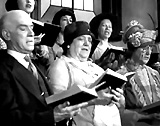
The Aging, Off-Key Adult Choir
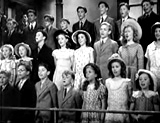
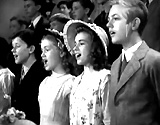
The Summer Replacement Children's Choir
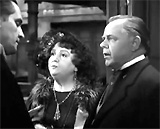
Upset Music Director Mrs. Thurston (Laura Hope Crews)
and Her Husband
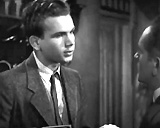
Son Hartzell: "I've been expelled"
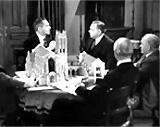
The Church Building Committee
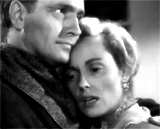
Hope to Will About Another Move: "We'll go.
I'll go with you"
|














